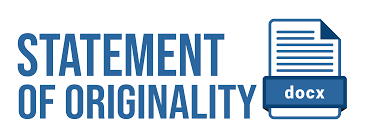Identification of types and abundance of microplastics in coastal sediments of Tanjung Jumlai Beach, North Penajam Paser Regency, East Kalimantan
DOI:
https://doi.org/10.30872/jipt.v4i1.1509Keywords:
fibers, fragmens, film, abundanceAbstract
The existence of microplastics is affected by the many activities in the community related to the use of plastic, as well as uncontrolled disposal of plastic waste so that plastic waste enters the waters through water flows and will degrade into smaller sizes. This research aims to identify the type, abundance, and composition, as well as determine differences in abundance between types of microplastics in Tanjung Jumlai Beach sediments. Sampling was conducted by drawing a transect line 100 meters long, then dividing it into 5 lanes each measuring 20 meters. Each lane was subdivided into sub-transect boxes measuring 5×5 meters. Then, within each 5×5 meter sub-transect, 1×1 meter sub-transect boxes were created, making 25 sub-transect boxes of 1×1 meter in each 20-meter lane. From these, 5 boxes were selected using randomizer application. Sediment samples that have been processed were then identified using a microscope. There were three types of microplastics found in Tanjung Jumlai beach, namely 65% fragments with an abundance of 10.340 particles/kg/m2, 19% fiber with an abundance of 2.960 particles/kg/m2, and 16% film with an abundance of 2.580 particles/kg/m2. There is a significant difference in abundance between fragment microplastics and film and fiber microplastics. There is no significant difference in abundance between film microplastics and fiber microplastics found on the coast of Tanjung Jumlai, Penajam Paser Utara Regency, East Kalimantan.
References
Browne, M., Crump, P., Niven, S., Teuten, E., Tonkin, A., Galloway, T., & Thompson, R. (2011). Accumulation of Microplastics on shorelines worldwide: Sources and SInks. Environ. Sci. Rechno;., 45 (21) : 9175-9179.
Dalimunthe, AM, Amin, B., & Nasution, S. (2021). Mikroplastik pada saluran pencernaan Kurau (Polydactylus octonemus) di perairan pesisir Pulau Karimun Besar, Provinsi Kepulauan Riau. Jurnal Ilmu Pesisir dan Kelautan, 2(2), 80-86.
Pasaribu, R. S., Nedi, S., & Elizal. (2021). Analisis Mikroplastik Pada Sedimen di Perairan Selat Panjang Kecamatan Tebing Tinggi Kabupaten Kepulauan Meranti Provinsi Riau. Jurnal Natur Indonesia, 51-56.
Perumal, K., & Muthuramalingam, S. (2022). Global sources, abundance, size, and distribution of microplastics in marine sediments-A critical review. Estuarine, Coastal and Shelf Science, 264, 107702.
Rijal, M. S., Annisa, N., Firda I. 2021. Kontaminasi Mikroplastik (Mps) pada Ikan di Indonesia. Prosiding Semnas Biologi FMIPA Universitas Negeri Semarang.
Septian, F. M., Purba, N. P., Agung, M. U. K., Yuliadi, L. P.S., Akuan, L. F., & Mulyani, P. G (2018). Sebaran Spasial Mikroplastik di Sedimen Pantai Pangandaraan, Jawa Barat. Jurnal Geomaritim Indonesia, 1(1):1–8.
Watts, A.J.R., Urbina, M.A., Goodhead, R., Moger, J., Lewis, C. & Galloway, T.S. 2016. Effect of Microplastic on the Gills of the Shore Crab Carcinus maenas. Environmental Science and Technology, 50(10): 5364–5369.
Yona, D., Zahran, M. F., Fuad, M. A. Z., Prananto, Y. P., & Harlyan, L. I. (2021). Mikroplastik di Perairan: Jenis, Metode Sampling, dan Analisis Laboratorium. Universitas Brawijaya Press.
Downloads
Published
Issue
Section
License
Copyright (c) 2025 Jurnal Ilmu Perikanan Tropis Nusantara (Nusantara Tropical Fisheries Science Journal)

This work is licensed under a Creative Commons Attribution-NonCommercial-ShareAlike 4.0 International License.








